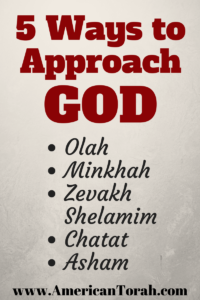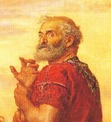5 Ways to Reconcile with God
 Numbers have a lot of significance in Scripture and five is one of the biggest. There were five ranks of Israel as they marched out of Egypt, five pillars of the Gate of Truth in the Tabernacle, five volumes of the Torah, five ingredients of the holy anointing oil, five stones in David’s pouch, and five sacrificial offerings by which we can draw closer to God.
Numbers have a lot of significance in Scripture and five is one of the biggest. There were five ranks of Israel as they marched out of Egypt, five pillars of the Gate of Truth in the Tabernacle, five volumes of the Torah, five ingredients of the holy anointing oil, five stones in David’s pouch, and five sacrificial offerings by which we can draw closer to God.
This week’s Torah reading (Vayikra, Leviticus 1:1-6:7) is primarily concerned with the five sacrifices. I haven’t spent a lot of time studying the sacrifices, so this post is pretty much off the top of my head. Even so, there are hints at some intriguing patterns:
Olah, the burnt offering.
Except for birds, the animals are to be killed and butchered by the one bringing the offering.
Birds are to be killed by the priest, who twists the heads off, breaks the wings, and spreads the whole animal out on the altar.
The flesh and entrails are wholly burned.
The blood is sprinkled.
The hide is preserved. Perhaps this isn’t the image God intended us to get, but I can’t help thinking of my hide having been saved from eternal fire.
It is voluntary to the individual Israelite.
It teaches us faith and obedience. We don’t necessarily know why God said to do this, only that he did. It is up to Israel to trust and obey without understanding.
Minkhah, the grain offering.
Must be unleavened grain. In the Scriptures, leavening usually represents sin.
Part is to be burned.
The remainder goes to the priest.
It is voluntary.
Zevakh Shelamim, the peace or thanks offering.
Done out of gratitude to God.
Portions of the fat are to be burned.
Some of the meat goes to the priest.
The rest of the meat forms the main entree of a feast for friends and family of the one who brought the sacrifice. It’s an occassion for a party.
It is voluntary.
Chatat, the sin offering.
Brought for sins of ignorance, not rebellion or deliberate sin.
The high priest offers a bull for himself.
If the whole community sins in ignorance, the priest offers a bull.
Asham, the guilt offering.
Brought for sins against our fellow men, not for sins against God.
The form of the offering depends on the financial state of the offerer.
Notice that there is no Levitical sacrifice for deliberate sins against God, “For if we sin wilfully after that we have received the knowledge of the truth, there remaineth no more sacrifice for sins.” There is only one remedy for such sin, and that is the blood of Yeshua activated in our lives by sincere repentance.
Another thought I had is that each of these offerings probably lines up with one of the five volumes of the Torah. Possibly also with one of the five volumes of the Gospel. (I am including Acts with the Gospels.) They might line up this way (or they might not):
Olah – Genesis – Discovering God
Chatat – Exodus – Salvation from the ignorance of the world
Zevakh Shelamim – Leviticus – Learning to worship
Asham – Numbers – Growing through pain out of rebellion
Minkhah – Deuteronomy – Fulfillment and standing on our own
(Thanks to Jon Behrens at Restoration Messianic Fellowship for the five central characteristics of the five books.)
A final thought on the gory nature of sacrifice. If you’ve ever slaughtered an animal, you’ve had occasion to witness the startling redness of fresh blood, like red paint, and the profound realness of the transition from living creature to inanimate meat.
We are real people, not just spirits. We are flesh and blood. That’s the way God made us, and it is how we are supposed to be. We could spend all our time contemplating spiritual matters and thinking about doing good things, and there is a certain amount of value in that. Whoever said, “You are what you believe you are,” was right to an extent. But if we neglect the corporeal side of our beings, we become what someone else said: “Too heavenly minded to be any earthly good.” We need such reminders that our different parts are intimately linked, that physical actions have spiritual consequences, and vice versa.
“The life is in the blood,” indeed.
The sign-up form below is for the main American Torah distribution list only. If you subscribe to the Common Sense Bible Study series, you will also be subscribed to this list, so you don't need to do both.
Do you ever wonder why churches don't teach what the Bible actually says?
We call ourselves Christians, so why don't we live as Christ lived?
Subscribe now and get a FREE copy of Prayers of John and Abigail Adams, a short collection of private and public prayers written by John and Abigail!
First Name
Last Name
Email Address
I AM READY FOR ANSWERS!



